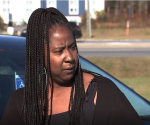COVID-19 is nation’s biggest cop killer, yet many officers are vaccine resistant
[ad_1]
A Homeland Security officer in Georgia and a deputy sheriff in Kentucky are among the nearly two dozen law enforcement officers who died last month of COVID-19, now the leading cause of job-related deaths among U.S. police professionals. Yet even as COVID-19 kills far more cops than gunfire, those whose duty it is to serve and protect the public are among the most resistant to getting vaccinated.
From California to New York, unions representing law enforcement are fighting requirements that members get immunized against the coronavirus, which has killed more than 500 officers since the pandemic began. While law enforcement officers were among the first front-line workers to be offered coronavirus vaccines, their vaccination rates by most accounts remain at or below the public at large.
While Americans employed in law enforcement are not alone in resisting vaccination, the outcry from their ranks to vaccine mandates has been particularly virulent. Unions and others speaking for police officers are taking umbrage as some U.S. cities and counties enact vaccine mandates for government employees.
“It’s a sad situation that we’re in, that something that can protect their lives and everyone else’s has become such a point of resistance,” said Sandra Crouse Quinn, a professor of family science at the University of Maryland who has studied how communication plays a part in vaccine acceptance.
Mandates work best with education and dialogue, “so officers with questions about the vaccine have opportunities to talk to health care providers. I don’t know to what extent that’s happening,” Quinn added.
The ongoing battles are playing out as the death toll from COVID-19 continues to rise on a nearly daily basis. At least 21 officers died in the month of October alone after contracting the virus on the job, according to the Officer Down Memorial Page, or ODMP, a nonprofit dedicated to honoring the nation’s fallen law enforcement officers.
Those who’ve died in recent weeks after contracting COVID-19 at work include Victor Donate, 58, a U.S. Customs and Border Protection officer who became infected while assigned to Atlanta International Airport. The former U.S. Navy pilot is survived by a wife and three kids, according to the Department of Homeland Security.
U.S. Department of Homeland Security
The recent deaths also include 31-year-old officer Kris Hutchison, who contracted COVID-19 while working at the Haltom Middle School in Haltom City, Texas. The Marine Corps veteran died on October 27 after four weeks in a hospital ICU, according to a local CBS affiliate. In Kentucky, Floyd County Deputy Sheriff Oliver Little died at 46 on October 13, just weeks after contracting COVID-19 in the line of duty.
The virus killed more police officers nationwide last year than all other causes combined, according to data from the National Law Enforcement Officers Memorial Fund. Coronavirus also was the most common cause of duty-related deaths in 2020 and 2021, according to the ODMP.
In Pennsylvania’s second most populated city, a standoff over a vaccine requirement coincided with reports of a third Pittsburgh police officer dying of COVID-19 within the last month. Pittsburgh on November 1 announced that all of its workers must be vaccinated by December 22, prompting the union representing police to file a grievance and unfair labor practice.
Bob Swartzwelder, president of the Fraternal Order of Police Fort Pitt Loge No. 1, which represents 906 active Pittsburgh police officers, told CBS MoneyWatch on Monday the city had a responsibility to negotiate before ordering his members to get the shots.
“I’m pro-vaccine but I’m anti-mandate,” said Swartzwelder, who described himself as fully vaccinated.
The city has already lost 78 officers to retirement, resignation or death this year, and another 257 are eligible to retire, and the mandate may well hasten their decision to leave, Swartzwelder warned. “It takes 18 months to fully train a police officer and put them on the street. You already have a police department in crisis.”
The union leader questioned how the city can demand workers be vaccinated yet allow protests, parades, football games and “all these non-critical events to occur.”
In Chicago, the police union scored a victory in its fight against a policy requiring its officers to be vaccinated by the end of the year, with a Cook County judge on November 1 suspending the city’s mandate. Chicago officers, however, are still required to report their vaccination status and get tested twice a week if unvaccinated.
Local CBS 2 Legal Analyst Irv Miller called the decision a partial win for both sides.
“The city gets to keep their mandate about reporting whether you’ve been vaccinated, and the [Fraternal Order of Police] got rid of the December 31 order – which could have resulted in a lot of terminations,” Miller said.
FOP Union President John Catanzara last Wednesday continued to call for rank-and-file resistance: “The goal now is to have over 1,000 or 2,000 officers subject themselves to disobeying a direct order. They can never process that many,” he stated in a video posted on YouTube.
Catanzara did not return a request from CBS MoneyWatch for further comment.
According to data from the city, 3,435 officers and civilian CPD employees had yet to report their vaccination status as of Monday, 300 fewer than a week earlier. Chicago Police superintendent David Brown on November 1 said 35 officers had been stripped of their powers for refusing a direct order to provide their statuses.
Equally abrasive, Los Angeles County Sheriff Alex Villanueva called a news conference last Tuesday to blast a vaccine mandate as a public safety threat, saying it would spur an exodus of deputies from his department.
While acknowledging that 15 members of his department have died of COVID-19, Villanueva has for weeks said he would not force his deputies to get inoculated, saying the decision should be left to individuals.
“People just don’t have faith in the vaccine, some of it is driven by a political ideology, some of it might be irrational, [and] some people might have a legitimate reason why they don’t trust the vaccine,” Villanueva said at a news conference on Tuesday. “And in a department in this profession, which tends to be dominated by people with a more conservative leaning, this is what you expect.”
The sheriff’s department declined further comment, and the union representing his deputies did not respond to a request for comment.
Michel Moore, chief of the Los Angeles Police Department, is taking a decidedly different approach to the mandate, and has agreed to enforce the rules. The differing stances of the two are reflected in the vaccination figures from their respective departments. About 53% of 16,070 Sheriff’s Department workers — sworn officers as well as civilian — had at least one vaccination shot, versus 74% of employees at the LAPD.
The LAPD did not offer further comment, and its union representing its officers did not respond to a request for comment.
Cops don’t like being told what to do
The reasons why those in law enforcement resist getting vaccinated against COVID-19 mirror the sentiments voiced across the country, much of it political in nature. But an overriding theme, it seems, is that nobody likes being ordered to do something, and cops are no exception. Further, police officers face danger on a regular basis, allowing some of them to brush off the threat from COVID-19.
While many police officers believe they are young and healthy enough to survive infections, “others don’t want to be told what to do,” Chuck Wexler, executive director of the Police Executive Research Forum, which advises police departments around the nation.
The notion that mandates infringe on individual rights has overtaken the larger public health and safety concerns, according to Wexler.
“Officers are getting sick and dying and yet you would think that they would be 100% getting vaccinated,” he said. “This is about health and safety, that’s what’s lost in this discussion. You have to ask yourself, is this really the kind of issue you would resign over?”
Still, the warnings that mandates would deplete the ranks and lead to chaos are not exactly playing out.
“People generally like feeling like they have a choice, and mandates can be frustrating in many circumstances, but that doesn’t mean they don’t work,” Adam Galinsky, a professor of leadership at Columbia Business School, told CBS MoneyWatch.
That is proving to be the case in New York City, where more than 92% of 160,500 city workers impacted by the city’s vaccine mandate were compliant as of November 3. That’s up from 84% on October 20, when the rules affecting police officers and firefighters were announced.
The union representing NYPD officers did not return a request for comment.
Decades of research has shown that pragmatic concerns can outweigh a strong point of view, Columbia’s Galinsky said.
“People can express attitudes, but when the moment comes to make a decision with a cost or tangible impact — you can’t always predict behavior from an attitude,” he explained.
Download our Free App
For Breaking News & Analysis Download the Free CBS News app
[ad_2]
Source link











